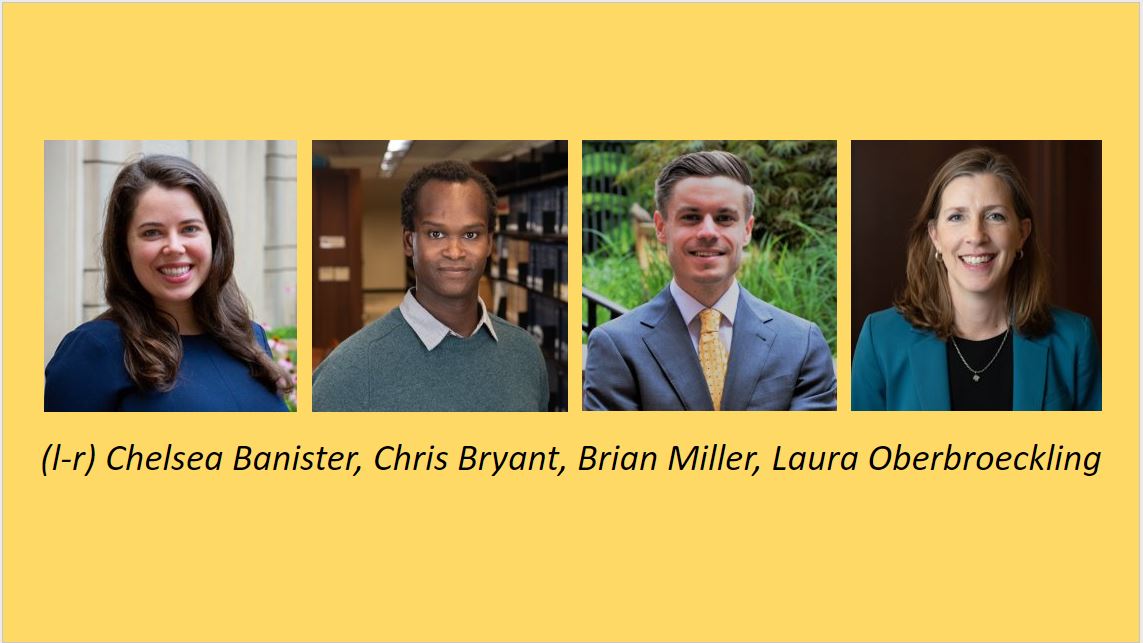This fall, the University of Maryland Francis King Carey School of Law launched the Donald Gaines Murray Teaching Fellows program. Murray Fellows teach in the law school’s innovative first-year Lawyering Program, which seamlessly integrates legal theory, doctrine, and professional skills.
The competitive fellowship spots are filled by distinguished candidates who are a combination of early-career lawyers and experienced practitioners seeking to enter legal academia. Built into the fellowship is structured mentorship from senior faculty and opportunities for the fellows to workshop their research.
“We are excited to launch the new Murray Fellows program,” said Professor Deborah Eisenberg, associate dean for academic affairs. “We envision this program as a pipeline for developing scholars who share qualities with the great Donald Gaines Murray for whom the fellowships are named.”
Donald Gaines Murray ’38 was the first Black person to graduate from the University of Maryland School of Law following the 1890 segregation of the University of Maryland professional schools (two Black students graduated with law degrees prior to 1890). In 1936, Murray was admitted to the law school as a result of the landmark civil rights case Murray v. Pearson, one of Thurgood Marshall and Charles Hamilton Houston’s first civil rights cases. Murray’s case laid the foundation for Brown v. Board of Education.
After graduating, Murray went on to build a successful law practice in Baltimore and was involved in several cases leading to the removal of the color barrier from the University of Maryland graduate schools. He was a member of the Baltimore Urban League and the American Civil Liberties Union.
“It is a privilege to honor Donald Gaines Murray by creating opportunities for developing scholars,” said Dean Renée McDonald Hutchins. “His success in making this law school open its doors is an inspiring reminder for us to keep up the fight for a more just society.”
Maryland Carey Law students benefit from the fellowship program because it attracts dynamic practitioners to teach in the 1L Lawyering Program, which places students in the role of attorneys in the context of simulated cases involving doctrinal subject matter from their other first-year courses.
"Our talented Murray Fellows bring such varied professional experiences to their teaching, ranging from voting rights to health care to trademark law,” said Assistant Professor Anne-Marie Carstens, director of the Lawyering Program. “They have all been the boots on the ground in the legal profession recently, so their insights into today's fast-paced legal practice greatly enrich our students."
This year’s cohort of Murray Fellows comprises a stellar lineup:
Chelsea Banister is a graduate of the University of North Carolina School of Law. After graduation, she clerked for Judge David Norton in the U.S. District Court for the District of South Carolina and then practiced commercial and trademark litigation as an associate at Kilpatrick Townsend & Stockton LLP in Washington, DC.
Chris Bryant is a graduate of Duke Law School and the first Black editor-in-chief of the Duke Law Journal. Bryant clerked for Judge James Wynn Jr. on the U.S. Court of Appeals for the Fourth Circuit, and Judge Richard Gergel on the U.S. District Court for the District of South Carolina. After working for a small plaintiffs’ firm, Bryant moved to Perkins Coie to litigate voting rights cases and then founded Boroughs Bryant, LLP.
Brian Miller is a graduate of the University of Virginia School of Law and clerked on the U.S. Court of Appeals for the Fifth Circuit. Prior to that, he served as an associate attorney general at the North Carolina Department of Justice and a law clerk on the Supreme Court of North Carolina.
Laura Oberbroeckling is a graduate of Harvard Law School. She started her career at Piper & Marbury, became a partner at Mintz Levin, and eventually started her own practice representing institutional health care providers, with a special focus on providing advice and counsel to providers of substance use disorder treatment and long-term care.

